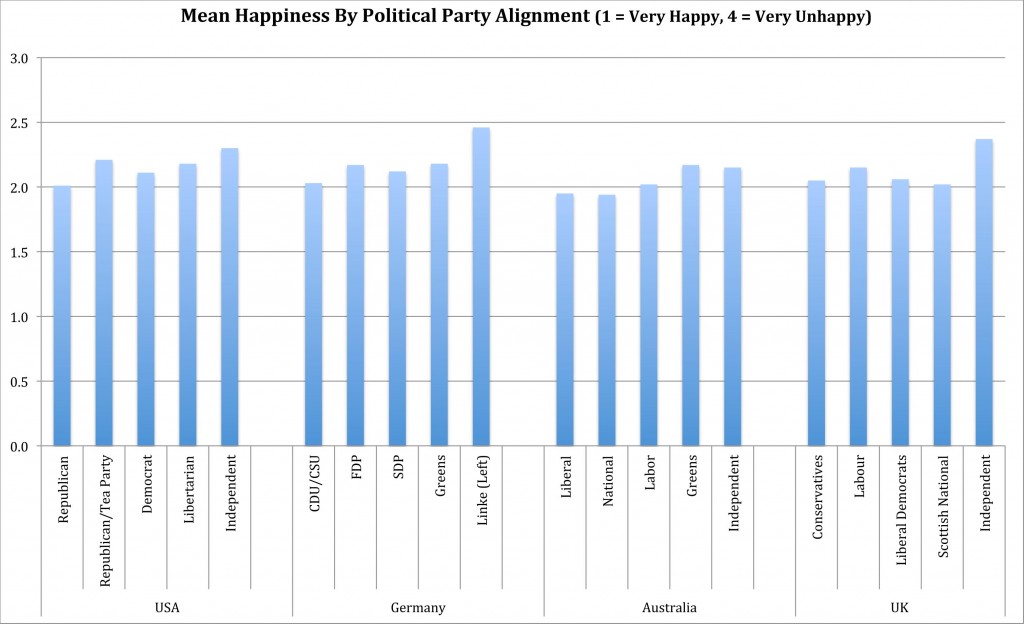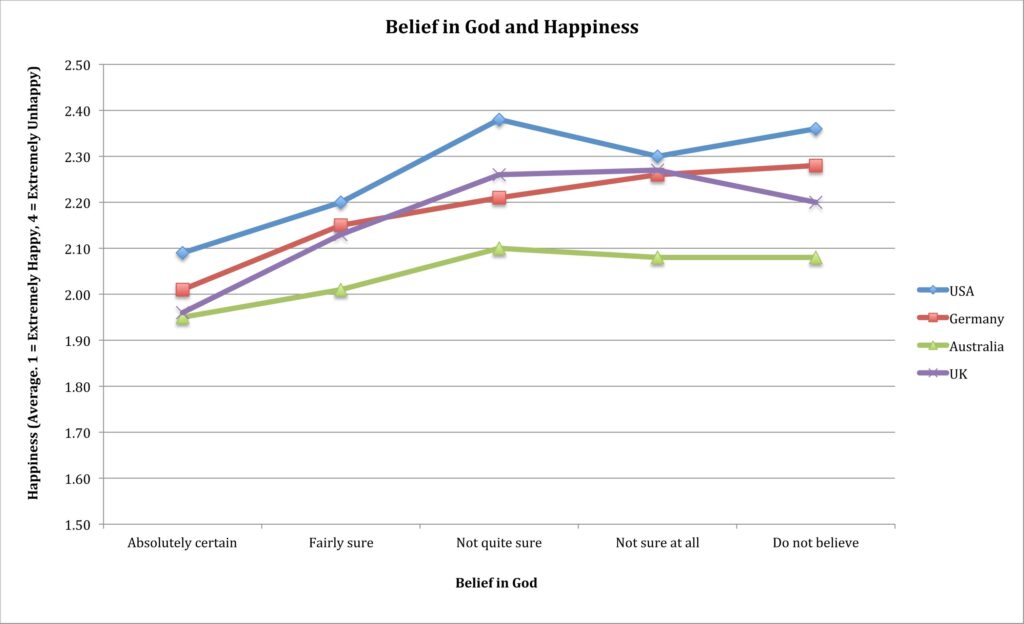Late last year The PBS News Hour aired a discussion where various pundits and think tank researchers attempted to rationalize some survey results showing that “conservatives where happier than liberals (Why Are Conservatives Happier Than Liberals? | PBS NewsHour | Dec. 9, 2011 | PBS). Despite the ex post facto aspect of this exercise the question I have to ask is this really (a) true and (b) meaningful. There is a tendency at times to believe that (a) surveys tell you something about people and (b) that what holds in the American sociopolitical sphere makes sense around the globe.
Well, I just happen to be lucky in that we have this data because we thought so much of measuring happiness on a scale (please note that this is sarcasm) that we threw it into our recent research project on the measurement of social, political and economic values. What do we find?
Politics and Happiness
The first set of results can be seen in the graph to the left. This information is presented so that more “conservative” parties are to the left (mainly). What do we see. First, unlike the American Enterprise Institute study, we ask a slightly different question — which party best represents your social, economic and political beliefs? So we are not attempting to ask people about their conservatism as this would create a comparison bias where one person’s conservatism is another person’s liberalism (i.e., people may use the scale differently but our question is clear and definitive). Second, what we see is that (a) basically there is not a lot of difference between self professes “happiness” of individuals of different political persuasions.
Hence, the idea that conservatives are somehow a bunch of happy campers while liberals are wallowing in schadenfreude is basically not true. In the US case, the least “happy” campers are Tea Party types. But overall there is not much of a difference that it would be considered material. In the case of the UK there are no differences at all between conservatives and liberals. In the case of Australia, we see that the conservatives (Liberals and Nationals) do indeed appear to be a happier lot, while the most left wing group (the Greens) are slightly less happy (note that no one is “unhappy”, just less “happy”). In the case of Germany we see a bit of a trend in that the more conservative groups (CDU/CSU) are a bit happier than their moderate cousins (FDP, SDP) and these are happier than the left wing groups (Greens and Linke). However, overall these differences are not materially meaningful as we are talking about groups where they are differing over whether they are very happy or just pretty happy.
We can take this one step further and see if there might be another explanation that makes more sense. In the graph below is data revealing happiness versus the certainty of belief in god (something I used in an earlier blog). This is a little more interesting in that individuals with a stronger certainty in god’s existence seem to profess greater happiness (remember a higher score is less happy in our presentation). But again, these are smallish differences. However, there is a clearer trend in this case. As a rule those aligned with conservative political parties also have a greater belief in the certainty of god’s existence.
Hence, the discussion seen in the PBS report, which seems to insinuate that happiness is linked to issues related to economic inequality and current factors related to the economic crisis, is not really supported. Their discussion is naive and really reflective of casual ex post facto inductive justification of the beliefs of the pundits in question (i.e., they are reading data to confirm what they think). It is also possible that what is revealed in the “happiness” statistics is something more closely related to the individuals personal attitude and feelings about their life in a more general sense. Those with stronger religious beliefs rely much more on faith than rationality to motivate their daily lives and hence their feeling of greater happiness may simply be a reflection of that (or a reflection of cognitive dissonance).



But didn’t the PBS report point out that it is not only the AEI study that made those findings? If I recall correctly, studies from a range of institutes have found similar results since 1974.
Both liberal and csrvenvatioes want clean air, clean water and a healthy environment. The difference comes in their basic philosophies. Liberals believe the government should get involved and fix the environment through a series of laws. The want to tax polluters. They want to cut back on our use of energy. They want the government to put controls on how many miles our cars must get per gallon of gas. They want to join Kyoto and place stops on our industrial growth.Conservatives believe that we can still grow and let the free market find the solutions for our environmental problems. We will have more gasoline efficient cars when the public buys them. We will have biofuels, oilgae, etc. when the free market makes it economically viable. People will start producing mini refineries in their back yard to produce bio-diesel and all sorts of things in our future that we cannot imagine today. Many of our legislative actions will be counterproductive to the creativity of human ingenuity.Therefore conservative don’t even want to believe that global warming exists. If they admit it exists then they would have to do something about it and that would be contrary to their basic philosophy of allowing free market capitalism to run its own course.